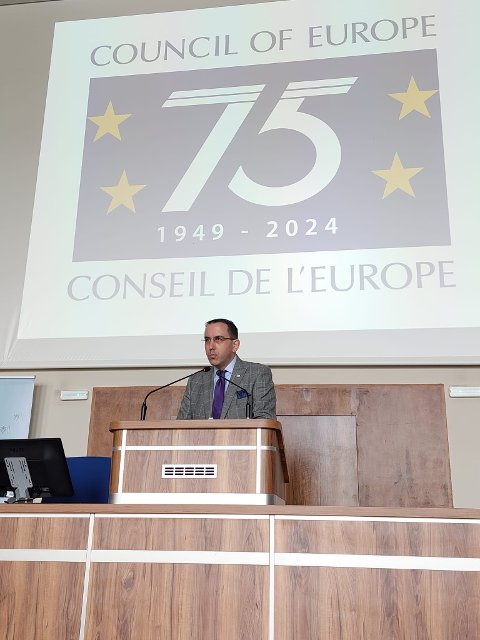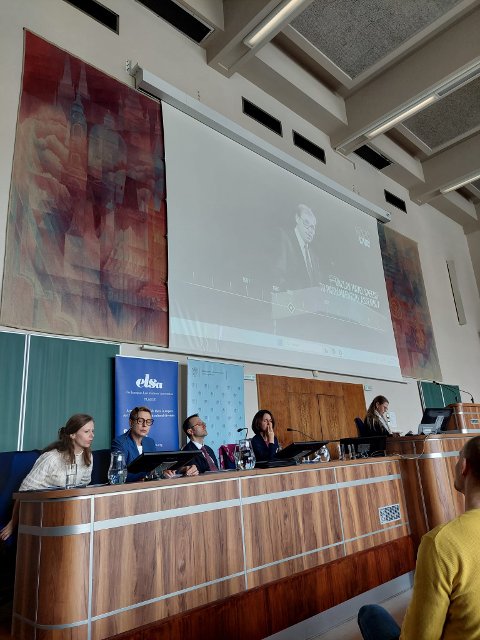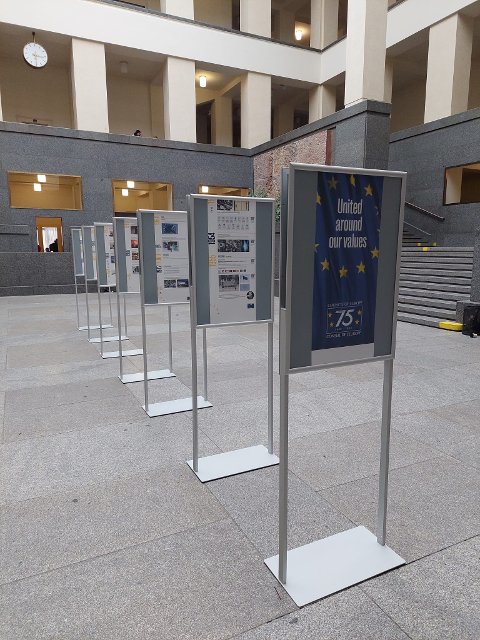Students Discussed the Biggest Challenges of Council of Europe with Deputy Minister Marian and Czech
25.04.2024 / 11:09 | Aktualizováno: 26.04.2024 / 12:16
On Tuesday, April 23, 2024, the Ministry of Foreign Affairs, in cooperation with the Faculty of Law of Charles University and the European Law Students' Association, organized an event for students entitled "75 Years of the Council of Europe: Benefits and Challenges". The discussion focused on what the Council of Europe brings to its 46 member states and 675 millions of Europeans, how the organization has responded to Russia's aggression against Ukraine, and how it is addressing current challenges, such as the impact of artificial intelligence on human rights and democracy. The participants highlighted the thorough expert work of the Council of Europe in support of human rights, democracy and the rule of law. It was reminded, that the Council of Europe is part of a broader European project and also supports countries whose prospects of EU membership are still far away.
The discussion was opened by the Dean of the Faculty of Law, Radim Boháč, followed by the Deputy Minister of Foreign Affairs Jan Marian. Czech representatives in the bodies of the Council of Europe presented their views on current topics within this organisation. Kateřina Šimáčková, the Czech judge of the European Court of Human Rights, emphasized that the establishment of the Council of Europe was a response to the tragic events of the Second World War.
"Accession to the Council of Europe meant for Czechoslovakia in 1991 (or for Czechia, in 1993) the first step in its return to democratic states respecting rule of law," highlighted Ambassador Petr Válek, Permanent Representative of the Czech Republic to the Council of Europe. It also played a historic role in response to the Russian aggression against Ukraine, as Deputy Minister Jan Marian recalled: "The Council of Europe reacted immediately to Russia's aggression against Ukraine, and just the day after the attack began, on February 25, 2022, Russia's voting rights in the organization were suspended, and less than a month later, on March 16, 2022, Russia was completely excluded from the organization." Other steps followed, such as the establishment of the Register of Damage Caused by Russian Aggression, thanks to which Ukrainians who have suffered property and other damage can now register their claims.
The speakers paid attention to the broad activities of the Council of Europe in other areas as well. Judge Kateřina Šimáčková presented her view of the European Court of Human Rights, which gives people a unique opportunity to sue the state and achieve justice in cases where it is not possible at the national level. Professor Helena Hofmannová shared her findings within ECRI, a commission specializing in the fight against racism, discrimination, xenophobia, anti-Semitism and intolerance in Europe, whose recommendations are also used by the European Court of Human Rights and the EU.
Ambassador Petr Válek shared his experience from working within the Council of Europe, including the creation of the Register of Damage Caused by Russian Aggression against Ukraine, which was also promoted by Czechia. Monika Hanych introduced the students to the recently negotiated Council of Europe's Convention on Artificial Intelligence, Human Rights, Democracy and the Rule of Law. The audience was interested in the future of the Council of Europe, how the Council of Europe communicates with the public and how the judgments of the European Court of Human Rights are being used in the Czech judicial practice. The moderator, Professor Veronika Bílková, Vice-President of the Venice Commission, summed up the discussion: "We need the Council of Europe and the Council of Europe needs us."
The event was accompanied by a thematic exhibition of the history of the Council of Europe that can be viewed during this week in the entrance hall of the Faculty of Law.

Students Discussed the Biggest Challenges of Council of Europe with Deputy Minister Marian and Czech Representatives Working in the Organization

Students Discussed the Biggest Challenges of Council of Europe with Deputy Minister Marian and Czech Representatives Working in the Organization

Students Discussed the Biggest Challenges of Council of Europe with Deputy Minister Marian and Czech Representatives Working in the Organization
